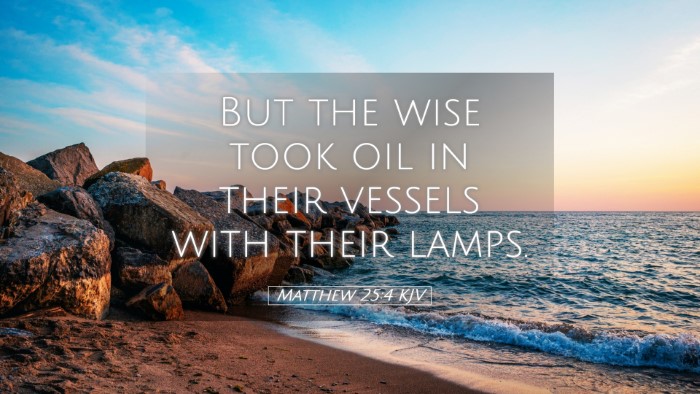Commentary on Matthew 25:4
Verse Reference: Matthew 25:4 - "But the wise took oil in their vessels with their lamps."
Introduction
This verse is a part of the Parable of the Ten Virgins, which serves to illustrate the kingdom of heaven’s preparedness and the necessity of being vigilant in faith. In this commentary, insights from historical theologians, such as Matthew Henry, Albert Barnes, and Adam Clarke, will be synthesized to provide a rich understanding of this passage.
Context of the Parable
The backdrop of Jesus’ teaching in Matthew 25 is critical for understanding this verse. It deals with the theme of readiness and the consequences of neglecting spiritual vigilance. The parable contrasts the wise virgins, who are prepared for the bridegroom's arrival, and the foolish ones, who are not.
Exegesis and Insights from Commentators
1. The Wise and the Foolish Virgins
- Matthew Henry: Henry emphasizes that wisdom in scripture often relates to preparedness and moral prudence. The wise virgins are those who possess a depth of spiritual readiness, which represents a heart aligned with God's will.
- Albert Barnes: Barnes gives attention to the practical action of the wise virgins, highlighting that their decision to take oil signifies the importance of genuine faith and the grace of God as essential preparation for the coming of Christ.
- Adam Clarke: Clarke elaborates on the metaphorical use of “oil” as symbolic of the Holy Spirit and divine grace that sustains the believer. The act of taking oil in vessels signifies an ongoing relationship with God, crucial for sustaining faith.
2. The Significance of Oil
- Spiritual Significance: Oil in the Bible is often associated with anointing, illumination, and the presence of the Spirit. In this parable, the oil's absence in the foolish virgins illustrates a lack of spiritual vitality and preparedness.
- Practical Application: The wise took proactive steps to ensure they had enough oil. This diligent planning reflects a commitment to spiritual pursuits that must not be overlooked by the believers today.
3. The Vessels of the Wise Virgins
- Matthew Henry: He points out that the vessels represent our lives, where the oil of the Spirit can be contained. The capacity to hold oil reflects our readiness to receive and maintain God’s grace.
- Albert Barnes: He notes that vessels can imply the need for preparation and customization of one's faith journey. This personal preparation is paramount for one’s spiritual readiness.
- Adam Clarke: Clarke emphasizes that these vessels also point to the relational aspect of faith—preparedness requires not only personal oil but also mutual encouragement within the community of believers.
Lessons and Applications
1. The Importance of Preparation
In Matthew 25:4, the wise virgins demonstrate that spiritual readiness is an essential aspect of discipleship. Believers are called to cultivate their faith through prayer, scripture study, and community engagement. This preparation is likened to practical measures one takes to ensure they are ready for an unexpected event.
2. Community and Mutual Encouragement
The parable subtly suggests the need for believers to support one another. Just as the wise virgins prepare, the Church is encouraged to provide an environment where faith can be shared, and spiritual oil can be replenished.
3. Faith as an Ongoing Journey
Taking oil in vessels signifies that faith is not merely a one-time event but a continuous journey. It involves regular seeking of God’s presence, seeking the filling of the Holy Spirit, and maintaining an ongoing relationship with Christ.
Conclusion
Matthew 25:4 serves as a poignant reminder of the necessity for vigilance, preparation, and the importance of the Holy Spirit's role in the life of the believer. Through the insights of historical commentators, we glean a deeper understanding of what it means to be wise in our spiritual endeavors. This parable ultimately calls each believer to examine their readiness for the coming of the Lord.


